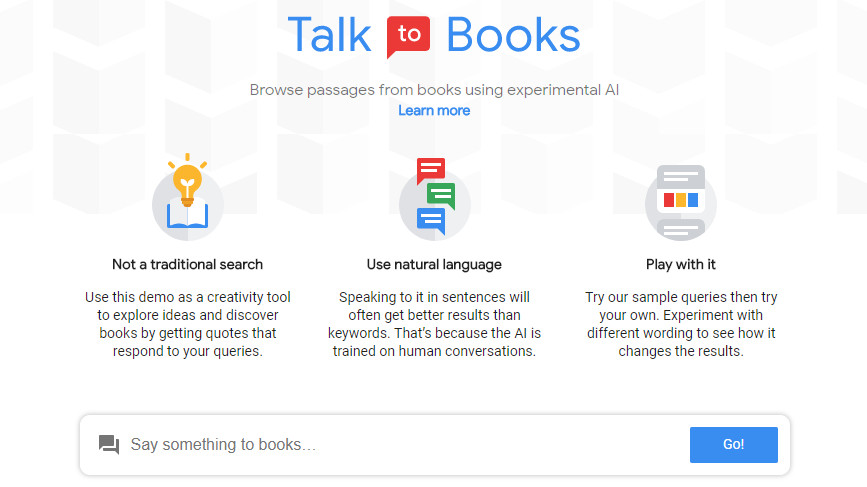Google wants you to have a conversation with a bookshelf

Got a question weighing on your mind? Google has launched a new AI experiment called Talk to Books, which lets you ask a collection of 10,000 titles anything you like using natural language and provides extracts that contain the answer.
At first it may sound like a simple text search, but Talk to Books is much smarter than that. The system doesn't rely on keywords. Instead, Google has used machine learning to teach it how real conversations flow. When you type your question, Google searches its catalog of books to find sentences that would follow naturally as an answer.
For example, if you ask "What does love feel like?" the system returns the passage: "It's a beautiful, floating feeling that is hard to describe in words. It's a wonderful feeling, almost like getting out of your body". It contains no keywords from the question, but is a perfectly reasonable response.
Not all the answers are likely to make sense, but it's an effective demonstration of how far natural language processing has come.
Play on words
Google has also launched a pair of word-association games called Semantris, which use the same conversational technology. They're tricky to explain, but simple to play.
Semantris Arcade presents you with a list of words and an empty text box. One of the words in the list is highlighted, and it's your job to help the AI identify it by providing clues.

For example, the list might contain the words football, lunch, face, plant, frozen and beer. If the word 'face' was highlighted, you might type 'nose'. This word is more closely related to 'face' than any other word in the list, so the AI will be able to guess the right answer. It won't always be so easy though, and the system might make some unexpected connections – especially when new words start dropping into the top of the list.
Sign up for breaking news, reviews, opinion, top tech deals, and more.
Semantris Blocks is the same concept, but based around Tetris. You're given a wall of blocks, some of which are labelled with words. Give a clue related to a word, and (provided the AI agrees) that block will be destroyed.
Those of a more cynical nature may suspect the games are in part designed to help 'train' Google's AI, although if that is the case Google isn't saying so.
"You may find delightful responses you want to share with us, or have suggestions for improving these demos," Google says of the games, before warning that "You may also see surprising or confusing responses – or even responses that make you uncomfortable." We were certainly surprised when it connected 'hamburger' and 'kitten' to 'inferno'.
- Want to expand your library? See our list of the best ebook download sites

Cat is TechRadar's Homes Editor specializing in kitchen appliances and smart home technology. She's been a tech journalist for 15 years, having worked on print magazines including PC Plus and PC Format, and is a Speciality Coffee Association (SCA) certified barista. Whether you want to invest in some smart lights or pick up a new espresso machine, she's the right person to help.